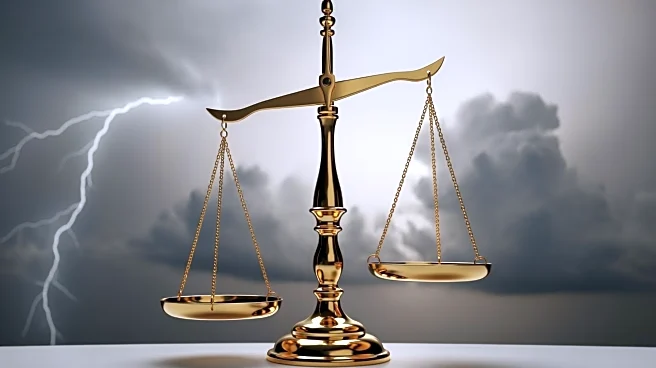What's Happening?
A recent AP-NORC poll reveals that only 36 percent of Americans approve of President Trump's handling of the economy. This marks a slight decline from previous months, where approval was at 37 percent in September
and 43 percent in August. The poll, conducted between October 9 and 13, surveyed 1,289 adults and found widespread pessimism about the economy, with 68 percent viewing it negatively. The survey highlights financial stress among Americans, with grocery costs, housing expenses, and savings being major concerns. Additionally, 47 percent of respondents expressed a lack of confidence in finding a good job if needed. The poll also indicates that 30 percent of Americans believe the country is headed in the right direction, while 69 percent think it is on the wrong track.
Why It's Important?
The declining approval rating for President Trump's economic policies is significant as it reflects growing public dissatisfaction amidst economic challenges. The poll results suggest that many Americans are feeling the impact of rising inflation and unemployment, which were reported at 2.9 percent and 4.3 percent respectively in August. The economic stressors identified in the poll, such as grocery and housing costs, are critical issues that affect everyday life and financial stability. This sentiment could influence political dynamics, especially as the government shutdown continues to affect public services and economic conditions. The dissatisfaction may also impact future policy decisions and electoral outcomes, as economic performance is a key factor in political support.
What's Next?
The ongoing government shutdown, which began on October 1, is likely to exacerbate economic concerns. As the impasse between Republicans and Democrats in Congress persists, the shutdown's impact on public services and the economy could further influence public opinion. Political leaders may face increased pressure to resolve the shutdown and address economic issues. The situation could lead to intensified debates over fiscal policies and government spending, with potential implications for future legislative actions. Stakeholders, including businesses and civil society groups, may advocate for solutions to mitigate the economic impact and restore confidence among Americans.
Beyond the Headlines
The poll results highlight deeper issues related to economic inequality and the distribution of wealth in the U.S. The stressors identified, such as housing and savings, point to broader systemic challenges that affect financial security and social mobility. The economic policies under President Trump, including tariffs and visa regulations, have had mixed effects on the market and workforce stability. These factors contribute to the ongoing debate about the role of government in managing the economy and addressing inequality. The public's perception of economic performance may influence future policy directions and the political landscape, as leaders grapple with balancing growth and equity.











